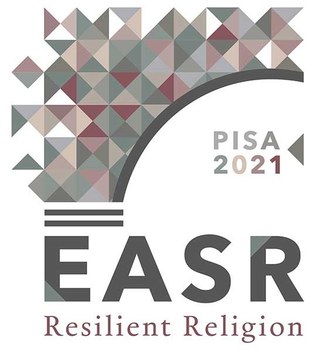Panel at Annual Conference EASR - Regional Conference IAHR 2021
Participation to the 18a International Conference of the European Association for the Study of Religions - Resilient Religions

the Project will be present at the18th Annual Conference of the European Association for the Study of Religions
IAHR Regional Conference
Pisa, 30 August – 3 September 2021
https://www.easr2021.org/
GENERAL THEME: RESILIENT RELIGION
Resilience can be considered as the ability to counteract or absorb a process of transformation. It is also characterized by a capacity to endure changes without having to adapt permanently, an ability to find what best suits new environmental conditions; and an awareness of how to cope with a crisis. In this sense, religion – whether in its institutionalized forms or just as a simple belief in any relationship with a super-human agency – represents a powerful tool for reacting to difficult situations and establishing a relationship with the sacred thanks to the interaction between spirituality, mindfulness, empathy and the emotions.
PANEL SESSION: Coping with the krisis. Phenomena of religious acculturation and enculturation: Patterns and policies of resilience from the Hellenistic-Roman period and Late Antiquity.
ORGANISERS/ CHAIRS: Alice Bencivenni, Beatrice Girotti, Giuseppina Paola Viscardi
ABSTRACT:
The present workshop proposal aims to analyze change and resilience in ancient individuals and society, in particular with respect to acculturation and enculturation phenomena occurring in times of krisis, as in the Hellenistic age and Late Antiquity, taking into account modern definition of acculturation and enculturation concepts.
Essentially, acculturation is defined as the extent to which people are participating in the cultural norms of the dominant group while maintaining the norms of their original culture (Berry 1980; Segall, Dasen, Berry & Poortinga 1999). Rather, the term enculturation can be helpful in more fully describing the experiences of these individuals, considering enculturation as the process of socialization to and maintenance of the norms of one’s heritage culture, including the salient values, ideas, and concepts (Herskovits 1948). Based on this definition, it can be explained that the “cultural maintenance” process that is described above might be better represented with the broader terminology of enculturation.
By these premises, focusing on the Hellenistic age and Late Antiquity as two turning points that marked radical changes “in the ancient political systems, social structures, religious beliefs, philosophical thinking, economic models and cultural trends”, we intend to explore policies and strategies of transition, transformation and mutation with related repercussions on the level of collective and individual perception and creation of new patterns of adaptation, absorption or even resistance capable of facing the collapse of ontologies that results from transformation and, thus,of ensuring the survival of groups and individuals.
REFERENCES:
• Berry, J.W. (1980). Acculturation as varieties of adaptation. In A.M. Padilla (Ed.), Acculturation: Theory, models and some new findings (pp. 9-25), Boulder, CO: Westview.
• Herskovits, M.J. (1948). Man and his Works, The Science of Cultural Anthropology. New York, Alfred A. Knopf.
• Segall, M. H., Dasen, P. R., Berry, J. W., & Poortinga, Y. H. (Eds.). (1999). Cognitive Processes. In: Human behavior in global perspective: an introduction to cross-cultural psychology (pp. 160–185). Allyn and Bacon.
FURTHER READING:
• Cecconi, G.A., Gabrielli, C. (eds.). (2011). Politiche religiose nel mondo antico e tardoantico: poteri e indirizzi, forme del controllo, idee e prassi di tolleranza. Atti del convegno internazionale di studi, Firenze, 24-26 settembre 2009. Bari, Edipuglia.
LIST OF CONVENORS
Stefano CANEVA (Università di Padova), A contagion of Soteria: A cultural history of the epithet Soter used of Hellenistic rulers
Giovanni Alberto CECCONI (Università di Firenze), Strategies for individual and collective resilience through apostasy in the light of 4th and 5h century homiletics
Beate DIGNAS (Somerville College Oxford), Transfers of cults in the Hellenistic world as krisis and resilience par excellence
Margherita FACELLA (Università di Pisa), Roman statesmen refusing ‘god-like’ honors: religious resilience, ethical choices and political prudence
Lech TRZCIONKOWSKI (Jagiellonian University in Kraków), The sacred books of the last pagan generations as a form of religious resilience
Discussant: Miguel HERRERO DE JAUREGUI (Universidad Complutense de Madrid)